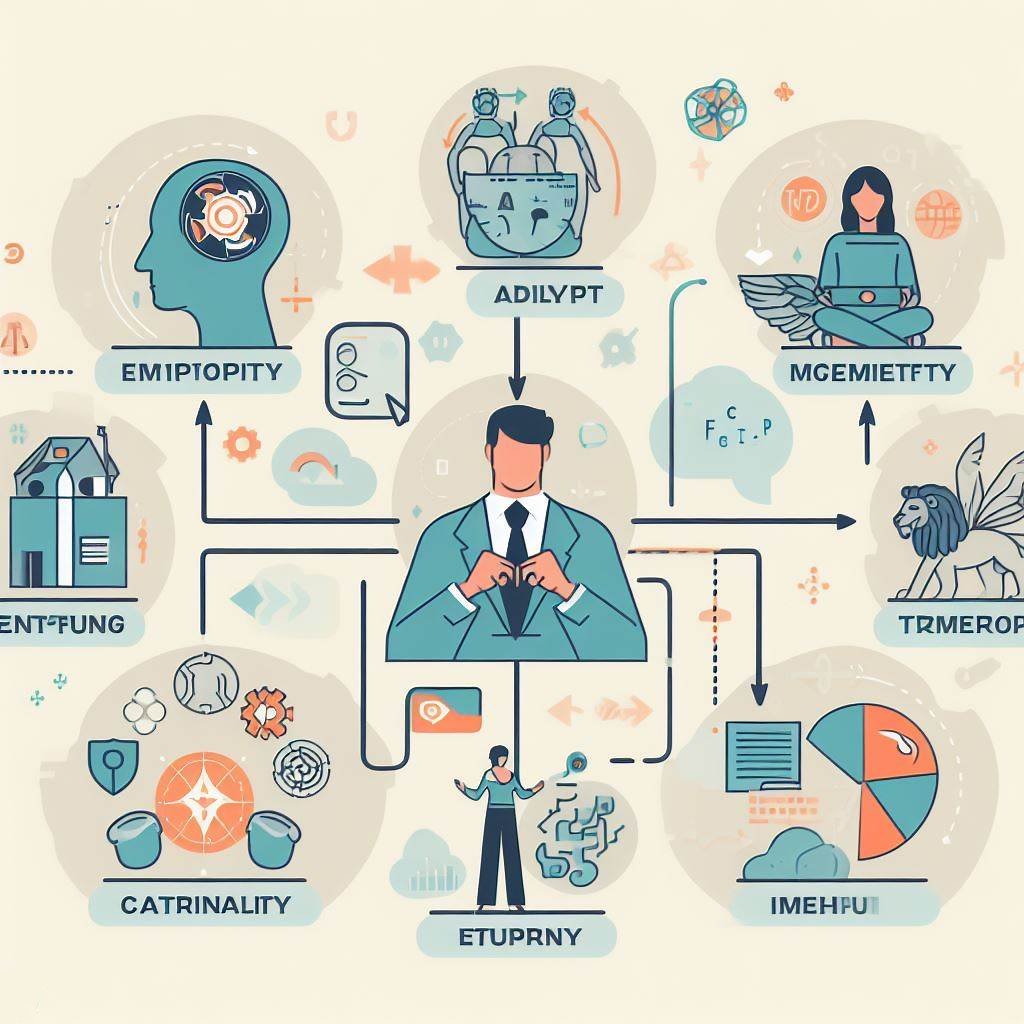
ENTPs are known for their quick wit, endless curiosity, and passion for debate. This outgoing, enthusiastic personality type makes up about 3% of the population. ENTPs lead with extroverted intuition (Ne), allowing them to pick up on connections and patterns in the external world. They have an exploratory nature and enjoy brainstorming possibilities. ENTPs use introverted thinking (Ti) to logically analyze all the insights they gather.

ENTPs thrive on generating theories and testing their validity through discussion and questioning. With extroverted feeling (Fe) as their third function, ENTPs enjoy engaging with others even when playing devil's advocate. Their constant questioning helps propel conversations, though it may frustrate more sensitive types. ENTPs' fourth function is introverted sensing (Si), which allows them to compare new information to past experiences. However, ENTPs prefer speculative debate over practical details. Overall, ENTPs are innovative, unconventional thinkers who enjoy pushing boundaries.
As ENTPs lead with extroverted intuition, they actively scan their surroundings for new information to explore. They pick up on patterns quickly and generate endless possibilities. ENTPs also readily spot inconsistencies that spark further questioning. Since introverted thinking is their auxiliary function, ENTPs logically analyze their many observations and ideas. ENTPs enjoy mental sparring to stress test arguments from all angles.
Some typical characteristics of the ENTP personality include:
Excitable, enthusiastic nature - ENTPs take joy in brainstorming and sharing new ideas. Their passion is contagious.
Insatiable curiosity - ENTPs constantly explore new concepts and theories. Stagnation dampens their spirits.
Motivation via debate - ENTPs love a lively back-and-forth discussion. Their drive comes from questioning assumptions.
Adaptability and resourcefulness - ENTPs easily shift approaches and excel at improvising solutions on the fly. They think well under pressure.
Little interest in routine - ENTPs chafe at performing repetitive tasks by the book. They prefer improvising and trying new ways.
Intolerant of incompetence - ENTPs get impatient when people seem irrational or inefficient. Their standards are high.
Argumentative at times - ENTPs play devil's advocate constantly, which can come across as combative. They argue for sport.
Dislike of bureaucratic policies - ENTPs scoff at rules that seem illogical and readily question authority. Traditional methods irritate them.
At work, ENTPs feel stifled in structured corporate environments but thrive when given freedom. Their innovative thinking makes them natural entrepreneurs. In relationships, ENTPs' need for intellectual stimulation draws them to insightful partners who can match their wit and keep up with their debate skills.
With their vibrant energy and originality, ENTPs are valuable in any setting that needs unconventional solutions. ENTP strengths include:
ENTPs tackle each day with an insatiable zest to learn. Their enthusiasm spreads to those around them. ENTPs ask questions others overlook, sparking new explorations.
ENTPs easily handle pressure and think well on their feet. They improvise clever solutions when original plans fall through. ENTPs' adaptability helps them solve problems.
ENTPs generate imaginative possibilities and clever hypotheses. Brainstorming comes naturally to them. ENTPs bring an open-minded perspective.
With extroverted intuition, ENTPs quickly grasp interconnections and patterns in systems. This helps them understand underlying mechanics and find loopholes.
ENTPs get energized through lively discussion and debate. Questioning ideas and defending arguments engages them. Talking it out sparks their best thinking.
ENTPs enjoy the creative challenge of finding a solution with limited resources. Their flexibility allows them to cobble together ingenious answers.
Seeing potential directions, ENTPs craft strategies to reach goals. They create conceptual frameworks to execute on their visions.
With their vibrant energy and original mindset, ENTPs readily generate fresh possibilities. They bring insight and unconventional thinking to any team or organization.
While full of strengths, ENTPs also face a few challenges and potential areas for improvement. Some weaknesses associated with ENTPs include:
ENTPs play devil's advocate constantly, unable to resist debating every viewpoint. This can come across as combative and irritate those who take the arguments personally.
ENTPs quickly lose patience with people they see as illogical and inefficient. Their criticism can seem callous when others are struggling.
Mundane tasks bore ENTPs. They resist following standard procedures, often improvising entirely new - and not necessarily better - methods.
Jumping from idea to idea, ENTPs start many projects but may struggle to sustain attention on one long enough to achieve results. Priorities elude them.
ENTPs find detail-oriented work tedious. They focus on interesting patterns rather than practical facts, which can impact their follow-through.
Despite having decent people skills, ENTPs are often out of touch with their own feelings. They dismiss emotions as irrational, which frustrates feeling types.
ENTPs playfully prod others' beliefs to expose flaws in thinking. But their challenging questions often provoke deeper than intended.
With insight into their weaker areas, ENTPs can develop more productive habits. Slower friends can help them learn patience. Practicing empathy and setting project deadlines can also improve ENTP effectiveness.
ENTPs thrive on lively intellectual sparring in their relationships. They fare best with partners who enjoy theorizing and can match their wit.
ENFP
Shared extroverted intuition. Both bubbly, unconventional types full of ideas to discuss.
INTP ENTP and INTP have complementary strengths in innovation and logic. Endless debates.
ENTJ The shared extroverted intuition and thinking helps smooth communication between these types.
ESTP ESTPs add action and improvisation to the ENTPs' conversational nature. Lots of spontaneity.
ISFJ ISFJs prefer harmony and practical support over constant abstract debate. Intuition clash.
ESFJ
ENTPs should tone down criticism and argument to avoid hurting ESFJ feelings. Different priorities.
ISTJ ISTJs can become annoyed with ENTPs questioning traditions and standard methods. Very different thinkers.
INFJ INFJs seek deeper meaning while ENTPs playfully debate whatever topic arises. Values vs. logic.
Of course any two types can form healthy relationships with mutual understanding. But naturally judicious, practical types may find the ENTP's constant questioning grating in close relationships over time.
ENTPs thrive in dynamic work environments that provide autonomy and variety. Conventional corporate jobs often drain ENTPs. Well-suited careers include:

Consultant - ENTPs excel analyzing systems’ flaws and improvising creative solutions. Varied projects suit them.
Entrepreneur - With their visionary nature and distaste for bureaucracy, ENTPs often thrive starting their own companies.
Researcher - Constantly asking ‘why’ comes naturally to ENTPs. Academic research allows them to explore new theories.
Investment Banker - ENTPs identify lucrative investment opportunities through perceptive analysis and strategy.
Lawyer - The argumentative nature of ENTPs serves them well in legal careers debating cases.
Journalist - ENTPs enjoy questioning the status quo and unearthing hidden stories to share. Reporting suits them.
Software Engineer - ENTPs design systems creatively and debug programs through flexible analytical thinking.
Marketing Director - ENTPs craft innovative campaigns to engage consumers. They excel at strategic communication roles.
Psychologist - Theories of human behavior fascinate ENTPs. Psychotherapy allows them to help people grow.
ENTPs thrive when given freedom to analyze systems and engage in imaginative strategy. Highly independent, they eschew restrictive corporate policies and prefer directing their own paths. Careers that provide autonomy and novelty suit this creative type.
To realize their full potential, ENTPs should focus on improving skills outside their comfort zone such as:
ENTPs’ debating nature can inadvertently offend. Learning to temper critiques and frame feedback constructively develops tact. Simple phrasing tweaks can soften impact.
ENTPs often neglect mundane duties in favor of exciting ideas. Committing to methodically chip away at routine chores improves self-discipline.
ENTPs interrupt frequently in their enthusiasm. Consciously count to five before responding to let others finish expressing thoughts. Active listening strengthens relationships.
ENTPs view feelings as irrational and dismiss them too quickly. Discussing emotions more respectfully, both their own and others’, increases emotional intelligence.
Jumping between projects, ENTPs rarely complete anything. Setting firm deadlines and blocks of distraction-free time helps ENTPs achieve goals.
ENTPs argue bluntly without considering feelings. Gentler language makes discussions more productive and less painful for others. Tact requires awareness.
With effort, ENTPs can improve their diplomacy, focus and consideration. Though their strengths shine through debate, learning to discuss ideas cooperatively rather than combatively allows ENTPs to build stronger relationships and become more effective influencers overall.
As innovative thinkers who enjoy pushing intellectual boundaries, many pioneering ENTPs have left their mark across diverse fields. Well known examples include:
Benjamin Franklin
The Founding Father displayed ENTP traits like inventiveness and visionary thinking. His curiosity led him to discoveries across scientific realms.
Walt Disney
The masterful storyteller opened his theme parks as creative experiential spaces. Known for questioning norms, Disney built an imaginative empire.
Mark Twain
Twain crafted witty, irreverent stories satirizing society. The clever humor matches the ENTP personality’s love of wordplay and debunking pretense.
Salvador Dali
The iconic Surrealist artist subverted tradition through bizarre, dreamlike images, reflecting the unconventional perspective of ENTPs.
Bill Clinton
Clinton’s charisma, intellect and powers of persuasion align with typical ENTP strengths. However, his constant scandals reveal ENTP flaws as well.
Throughout history, influential ENTP figures have driven progress through their original thinking, visionary nature and skill persuading audiences. Their ingenuity leaves a legacy.
ENTPs approach the world with enthusiasm and curiosity. They have a clever wit and passion for debating ideas from endless angles. While prone to argumentativeness, ENTPs bring valuable insight and unconventional thinking to any team. Their strengths include adaptability, perceptiveness and motivation through lively discussion. ENTPs thrive when given autonomy to analyze systems and engage in imaginative strategy. With effort, they can become more diplomatic and develop their weaker areas while maintaining their innovative spirit. Overall, ENTPs are energetic visionaries whose mental flexibility and poignant questioning leads to new possibilities.